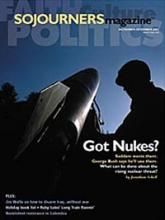This summer's World Summit on Sustainable Development in Johannesburg was supposed to be the inheritor of the 1992 Earth Summit in Rio de Janeiro, but it turned out instead to be the betrayer of its dreams. While progress was made in some significant areas, once again the United States and its allies made sure the gathering enshrined unrestrained free trade and corporate profitability as the world's "development" model.
Ten years ago, the Rio summit recognized the urgent need for all nations to respect and preserve the earth's natural resources while engaging in solutions that would create property for all. The summit produced a challenging document, "Agenda 21," that called for world leaders to evaluate a decade later the progress (or lack thereof) toward these solutions. The Johannesburg meeting was given the mandate to put into action a plan that would carry out the thrust of Agenda 21that is, to preserve the environment while promoting development.
To know whether or not it accomplished this, one must keep in mind the outcome of the March 2002 U.N. Conference on Financing for Development ("The Monterrey Consensus") that took place in Monterrey, Mexico. The Monterrey Consensus made it clear that the agenda for the United States and its partners (Australia, Canada, and Japan) for the foreseeable future would be "free trade," which they described as an engine for development. To facilitate free trade, a high level of importance was placed on "good governance," "private flows," and "security for corporations." The Monterrey Consensus put in place funding for whatever development (sustainable or not) the United States and its partners could push through the Johannesburg gathering.
Read the Full Article
